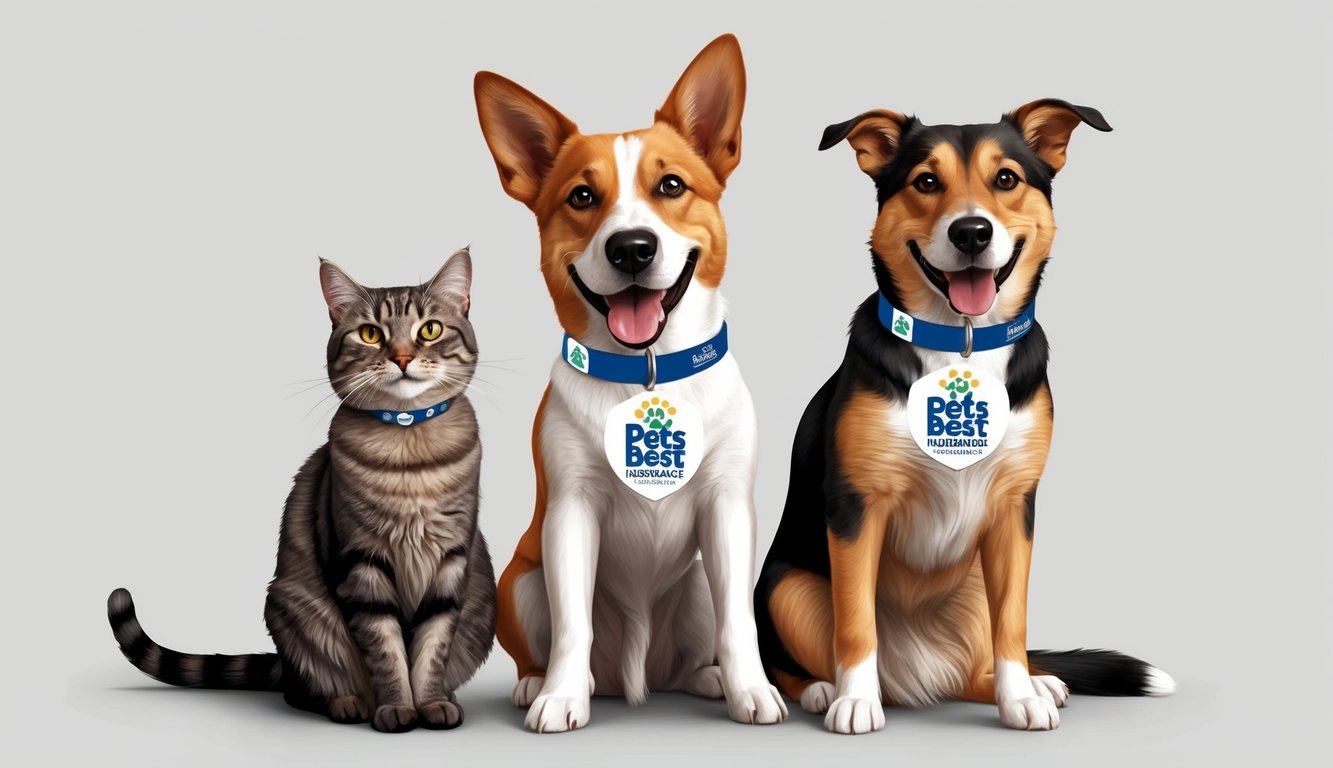Pet insurance provides financial protection for unexpected veterinary costs.
It helps cover expenses related to accidents, illnesses, and sometimes routine care for your furry companions.
With various options available, choosing the right policy can be crucial for your pet’s health and your peace of mind.
The best pet insurance offers comprehensive coverage, affordable premiums, and excellent customer service. When selecting a plan, you’ll want to consider factors such as coverage limits, deductibles, reimbursement rates, and waiting periods.
By comparing different providers and policies, you can find the optimal balance between cost and coverage for your pet’s specific needs.
1) Healthy Paws Pet Insurance
Healthy Paws offers a comprehensive pet insurance plan for dogs and cats.
You can customize your coverage with flexible deductible and reimbursement options to fit your budget.
The plan covers new accidents and illnesses, including emergencies and genetic conditions.
Your pet will be protected from head to paw, giving you peace of mind for unexpected veterinary bills.
Healthy Paws has been rated the #1 customer-rated pet health insurance plan for seven consecutive years.
This speaks to their commitment to customer satisfaction and quality service.
One of the standout features of Healthy Paws is their fast claims processing.
You can expect quick reimbursements for covered expenses, minimizing your out-of-pocket costs.
However, Healthy Paws does not cover pre-existing conditions.
This is a common policy among pet insurance providers, so be sure to enroll your pet while they’re young and healthy.
Healthy Paws offers a single plan option, which may be appealing if you find multiple choices overwhelming.
However, this means you won’t have the ability to add wellness or preventive care coverage.
When comparing costs, keep in mind that premiums can vary based on factors like your pet’s age, breed, and location.
It’s always wise to get quotes from multiple providers to ensure you’re getting the best value for your needs.
2) Trupanion
Trupanion offers comprehensive pet insurance for cats and dogs.
Their plans provide unlimited payouts for covered conditions, giving you peace of mind for your pet’s health care needs.
One of Trupanion’s standout features is their direct payment to veterinarians at checkout.
This means you don’t have to worry about filing claims or waiting for reimbursements.
The company covers hereditary and breed-specific conditions, ensuring your pet is protected against a wide range of potential health issues.
This can be particularly valuable for purebred animals that may be prone to certain genetic conditions.
Trupanion has over 25 years of experience in the pet insurance industry.
They have served over 1 million satisfied customers, demonstrating their reliability and customer satisfaction.
When you choose Trupanion, you can customize your deductible to fit your budget.
This flexibility allows you to balance your monthly premium with out-of-pocket costs.
It’s worth noting that Trupanion’s plans cover prescription food when it’s used to treat covered conditions.
This can be a significant benefit for pets with specific dietary needs due to health issues.
However, Trupanion does not cover exam fees.
You’ll need to factor this into your overall pet health care budget when considering their insurance plans.
3) Embrace Pet Insurance
Embrace Pet Insurance offers comprehensive coverage for cats and dogs.
You can expect coverage for accidents, illnesses, and wellness care.
Their policies are designed to provide financial protection for unexpected veterinary expenses.
With Embrace, you have the flexibility to customize your policy.
You can choose your annual maximum, deductible, and reimbursement percentage to fit your budget and needs.
One unique feature of Embrace is their diminishing deductible.
For each year you don’t file a claim, your annual deductible decreases, potentially saving you money in the long run.
Embrace also offers a Wellness Rewards program.
This optional add-on helps cover routine care expenses like vaccinations, grooming, and dental cleanings.
The company received high ratings from NerdWallet, earning 5 out of 5 stars for overall performance.
This indicates strong customer satisfaction and reliable service.
Pricing for Embrace pet insurance varies based on factors like your pet’s age, breed, and location.
On average, dog insurance costs about $54 per month, while cat insurance is around $26 per month.
When considering Embrace, review their policy details carefully.
Understand the coverage limits, waiting periods, and any exclusions that may apply to your pet’s specific needs.
4) Spot Pet Insurance
Spot Pet Insurance offers comprehensive coverage for your furry friends.
Their plans can start as low as $15 per month, making it an affordable option for many pet owners.
With Spot, you can customize your pet’s plan based on factors like reimbursement rate, coverage, and annual limit.
This flexibility allows you to tailor the insurance to your specific needs and budget.
Spot provides coverage for both dogs and cats.
They offer accident and illness plans that can reimburse up to 90% of eligible vet bills, giving you peace of mind when it comes to your pet’s health.
One standout feature of Spot is their multi-pet discount.
If you have multiple pets, you can enjoy a 10% discount for all additional pets on your policy.
Spot Pet Insurance has received positive reviews from industry experts.
NerdWallet awarded them 5 out of 5 stars for overall performance, highlighting their comprehensive coverage options.
When considering Spot, keep in mind that premiums can vary based on factors such as your pet’s age, breed, and your location.
It’s always a good idea to get a personalized quote to understand the exact costs for your pet.
5) Fetch by The Dodo

Fetch by The Dodo offers comprehensive pet insurance for dogs and cats in the United States and Canada.
You can choose coverage for up to 90% of your unexpected veterinary bills.
The company’s plan includes protection for accidents, illnesses, emergency care, hospitalizations, and surgeries.
Fetch also covers sick-visit exam fees, which some other providers might exclude.
You’ll find that Fetch includes coverage for breed-specific issues, making it a good choice if you have a purebred pet with potential genetic conditions.
The plan also provides boarding fees if you’re hospitalized and unable to care for your pet.
Fetch allows you to use any licensed veterinarian in the U.S. or Canada, giving you flexibility in choosing your pet’s healthcare provider.
After treatment, you can submit claims easily and receive reimbursements directly.
One unique aspect of Fetch is its coverage for virtual vet visits, reflecting the growing trend of telemedicine in pet care.
This feature can be particularly useful for minor concerns or initial consultations.
When considering Fetch, keep in mind that they offer various annual limits and deductible options.
You can customize your plan to balance coverage and cost according to your needs and budget.
6) Nationwide Pet Insurance

Nationwide offers comprehensive pet insurance plans for dogs, cats, birds, and exotic pets.
You can use any veterinarian with their policies, including specialists and emergency providers.
Nationwide’s pet insurance covers a wide range of medical conditions and treatments.
Their plans typically include coverage for accidents, illnesses, surgeries, and prescription medications.
You can choose from different coverage levels to suit your needs and budget.
Nationwide offers wellness plans that cover routine care, such as vaccinations and annual check-ups.
One unique feature of Nationwide is their coverage for exotic pets.
If you own a bird, reptile, or small mammal, you may find suitable insurance options with this provider.
Nationwide policyholders can benefit from a user-friendly online portal and mobile app.
These tools allow you to manage your policy, submit claims, and track reimbursements easily.
As a current Nationwide member, you may be eligible for a 5% discount on your pet insurance policy.
This can help you save on your premiums.
7) Pawp

Pawp offers a unique approach to pet coverage.
Unlike traditional insurance, it provides a 24/7 digital vet clinic and an emergency fund for a flat monthly fee.
For $24 per month, you get unlimited access to online veterinary consultations.
This service can be invaluable when you need quick advice or can’t get an immediate appointment with your regular vet.
The emergency fund is a standout feature.
It covers up to $3,000 for one emergency per year.
There’s no deductible, and the fund applies to any pet in your household.
You don’t need to worry about pre-existing conditions with Pawp.
The emergency fund covers all pets regardless of age, breed, or health status.
Pawp’s service is straightforward.
You pay a single monthly fee with no hidden costs.
There are no claim forms to fill out or reimbursements to wait for.
The digital clinic is available around the clock.
You can chat with licensed vets about any pet health concerns, from minor issues to potential emergencies.
One limitation is that the emergency fund only covers one incident per year.
If you have multiple pets or frequent emergencies, this might not be sufficient.
Pawp isn’t a replacement for comprehensive pet insurance.
It’s best viewed as a complement to your regular vet care or as an alternative for those who find traditional pet insurance too expensive.
8) ASPCA Pet Insurance

ASPCA Pet Insurance offers comprehensive coverage options for your furry friends.
You can choose from plans that cover accidents, illnesses, and even preventive care.
The company provides flexibility in customizing your plan.
You can select your annual deductible, reimbursement percentage, and annual limit to fit your budget and coverage needs.
ASPCA Pet Insurance allows you to use any licensed veterinarian.
This freedom ensures you can take your pet to the vet you trust most, even when traveling.
Preventive care coverage is available as an add-on to your policy.
These plans start at $9.95 per month and cover specific preventive treatments.
The insurance is underwritten by United States Fire Insurance Company and produced by C&F Insurance Agency, Inc. It’s important to note that the ASPCA itself is not an insurer.
Costs for ASPCA Pet Insurance plans vary based on several factors.
These include your chosen plan, location, and your pet’s species, breed, and age.
You can get a free quote online to see how much coverage would cost for your pet.
This allows you to make an informed decision about the best plan for your needs.
9) Pets Best Insurance

Pets Best offers comprehensive pet insurance for dogs and cats.
You can choose from accident and illness plans, routine care add-ons, and accident-only coverage to fit your needs and budget.
The company provides flexibility in selecting your deductible, reimbursement percentage, and annual limit.
This allows you to customize your policy to balance cost and coverage.
When processing claims, Pets Best applies your reimbursement percentage before subtracting the deductible.
This approach can be advantageous for pet owners, potentially resulting in higher payouts for covered expenses.
Pets Best pet insurance is underwritten by American Pet Insurance Company or Independence American Insurance Company.
These established insurers provide financial stability and reliability for your policy.
You can easily compare Pets Best plans with other providers to find the best fit for your pet.
The company strives to offer competitive coverage options and streamlined claim processing.
Pets Best has been in operation since 2005, giving them substantial experience in the pet insurance industry.
Their longevity suggests a track record of meeting pet owners’ needs.
Remember that your pet’s age, breed, and location will influence your premium rates.
Make sure to get a personalized quote to understand your specific costs and coverage options.
10) Petplan

Petplan offers comprehensive pet insurance coverage for cats and dogs.
Their accident and illness plan provides flexibility in choosing your deductible, with options of $250, $300, or $500.
You can customize your policy by selecting from various reimbursement options.
After paying for your pet’s veterinary expenses upfront, you submit a claim to Petplan for reimbursement.
Petplan’s policies cover a wide range of conditions, including chronic and hereditary issues.
This can provide peace of mind for pet owners concerned about long-term health problems.
The company offers 24/7 customer support, allowing you to reach out at any time with questions or concerns.
You can contact them by phone at 1-866-467-3875 or through their website’s contact form.
Petplan also provides equine insurance for horses up to 25 years old, as long as coverage begins before the horse turns 20.
These policies last for 12 months and include illness coverage.
Customer reviews for Petplan are generally positive, with an average rating of 9.2 out of 10 on Pet Insurance Review.
This suggests a high level of customer satisfaction with their services and coverage.
When considering Petplan, review their policy details carefully to ensure it meets your specific needs and budget.
Compare their offerings with other top pet insurance providers to make an informed decision.
Understanding Pet Insurance
Pet insurance provides financial protection for unexpected veterinary costs.
It offers peace of mind and helps ensure your furry friend receives necessary care without breaking the bank.
What Is Pet Insurance?
Pet insurance is a healthcare policy for your animal companion.
It reimburses you for covered veterinary expenses when your pet gets sick or injured.
Much like human health insurance, you pay a monthly premium to maintain coverage.
Most policies have a deductible, which is the amount you pay before insurance kicks in.
After meeting the deductible, the insurer covers a percentage of eligible costs, typically 70-90%.
Pet insurance usually doesn’t cover pre-existing conditions.
It’s best to enroll your pet when they’re young and healthy to maximize coverage.
Why Pet Insurance Matters
Pet insurance can save you from difficult financial decisions in emergencies.
Without it, you might face choosing between your pet’s health and your wallet.
Veterinary care costs can be substantial.
A single emergency visit could cost thousands of dollars.
Insurance helps manage these unexpected expenses.
It allows you to focus on your pet’s recovery rather than the bill.
You can choose the best treatment options without financial constraints.
Pet insurance also encourages regular check-ups and preventive care.
This can lead to early detection of health issues, potentially saving your pet’s life and reducing long-term costs.
Types of Pet Insurance
There are three main types of pet insurance:
- Accident-only plans: Cover injuries from accidents but not illnesses.
- Accident and illness plans: The most common type, covering both injuries and diseases.
- Wellness plans: Often offered as an add-on, covering routine care like vaccinations and check-ups.
Some insurers offer tiered wellness coverage.
For example, you might choose between $250, $450, or $650 of annual routine care coverage.
Accident and illness plans typically provide the most comprehensive coverage.
They protect against a wide range of health issues, from minor infections to major surgeries.
When choosing a plan, consider your pet’s age, breed, and health.
Some breeds are prone to certain conditions, making more comprehensive coverage advisable.
Choosing the Right Pet Insurance
Selecting the best pet insurance involves evaluating various factors, understanding coverage options, and comparing plans effectively.
Your pet’s specific needs and your budget will guide your decision-making process.
Factors to Consider
When choosing pet insurance, consider your pet’s age, breed, and health history.
These elements often affect premiums and coverage eligibility.
Your location also impacts costs, as veterinary care prices vary by region.
Evaluate your budget carefully.
Higher deductibles typically mean lower monthly premiums, but you’ll pay more out-of-pocket for each claim.
Annual coverage limits are crucial – ensure they align with potential veterinary costs in your area.
Consider waiting periods before coverage begins.
Most plans have separate waiting periods for accidents and illnesses. Embrace offers a short 48-hour waiting period for accidents, which can be beneficial for immediate coverage.
Common Coverage Options
Pet insurance plans generally fall into three categories: accident-only, accident and illness, and wellness coverage.
Accident-only plans are the most basic and affordable, covering injuries from accidents.
Accident and illness plans are the most common, covering both unexpected injuries and illnesses.
These plans often include coverage for chronic conditions, hereditary issues, and cancer treatments.
Wellness coverage is usually an add-on to other plans.
It covers routine care like vaccinations, annual check-ups, and preventive treatments.
Some insurers, like Pets Best, offer tiered wellness coverage options to suit different needs and budgets.
How to Compare Plans
Start by obtaining quotes from multiple providers.
Use consistent information about your pet to ensure accurate comparisons.
Pay attention to coverage limits, deductibles, and reimbursement rates.
Review exclusions carefully.
Pre-existing conditions are typically not covered, but definitions can vary between insurers.
Check for breed-specific exclusions that might affect your pet.
Consider customer service and claim processing times.
Look for providers with user-friendly online portals and mobile apps for easy claim submission. ASPCA Pet Health Insurance is noted for its experience in the industry, which can translate to smoother service.
Explore discounts.
Many insurers offer multi-pet discounts or savings for paying annually instead of monthly.
Some providers also give discounts for spayed or neutered pets.
Cost of Pet Insurance
Pet insurance costs vary based on several factors.
Understanding the components that make up your premium can help you choose the right coverage for your budget and pet’s needs.
Premiums and Deductibles
Pet insurance for dogs costs about $676 per year, while cat insurance averages $383 annually.
These figures can fluctuate based on your pet’s age, breed, and location.
Premiums tend to increase as your pet ages.
Deductibles typically range from $100 to $1,000.
A higher deductible usually results in lower monthly premiums, but you’ll pay more out-of-pocket for each claim.
Some insurers offer customizable plans, so you can adjust your deductible and coverage limits to fit your budget.
Understanding Reimbursement Rates
Reimbursement rates generally fall between 70% to 90% of covered expenses.
A higher reimbursement rate means you’ll pay less out-of-pocket for veterinary care, but it also leads to higher premiums.
For example, if your policy has an 80% reimbursement rate and you have a $1,000 vet bill, you’ll receive $800 from your insurer after meeting your deductible.
Some policies offer 100% reimbursement, but these are less common and more expensive.
Hidden Fees
Be aware of potential hidden costs when selecting a pet insurance policy.
Some companies charge transaction fees for monthly payments or policy changes.
Wellness plans often come with additional fees.
These plans cover routine care like vaccinations and check-ups.
While beneficial, they can significantly increase your overall insurance costs.
Look out for enrollment fees or one-time administrative charges when signing up for a new policy.
These fees aren’t standard across all providers but can add to your initial costs.
Cancellation fees may apply if you terminate your policy early.
Always read the fine print to understand all potential charges.






